Although malaria is almost entirely preventable thanks to prescription prophylactics, some travelers choose to avoid medication by steering clear of malaria risk zones. Side effects and cost are chief among the reasons, but it’s often the case for families traveling with children who aren’t keen on swallowing pills. For these travelers, the best option for a malaria-free safari is South Africa. While not zero-risk, many phenomenal game-viewing locations are completely absent of the mosquitoes that carry parasite-causing malaria. In the 10 game reserves listed below you won’t have to sacrifice to enjoy a malaria-free safari in South Africa.
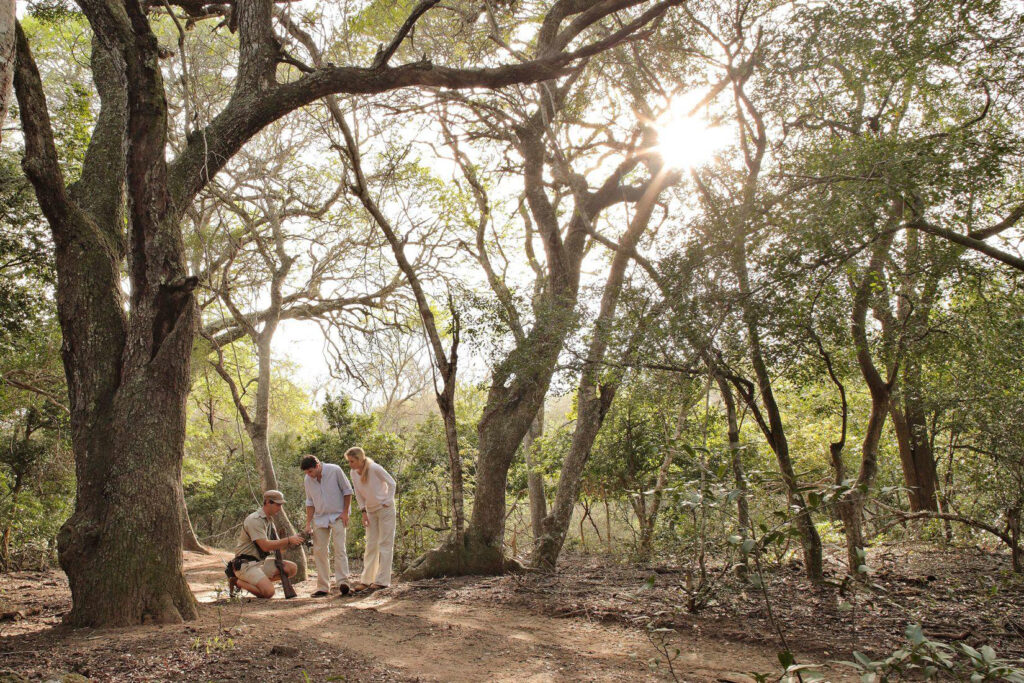
What is malaria?
Malaria is a disease transmitted by certain types of parasite-carrying mosquitoes. Especially prevalent in sub-Saharan Africa, this serious and sometimes fatal disease often presents as a high fever, chills, muscle aches or flu-like symptoms. Symptoms begin seven to 10 days after a person is infected, or even weeks after. In some recorded cases—up to a year later. Severe illness and fatalities are most common in children under five years of age who are not able to readily access health care. Pregnant persons traveling to countries of transmission will also want to take special precautions. A diagnostic blood test can confirm malaria and treatment requires prescription drugs. Anyone can be infected with malaria, and you can not be vaccinated against it.
Why some travelers dislike taking antimalarial drugs
No antimalarial is 100 per cent effective and there are many reasons travelers may prefer to avoid taking them. The biggest downside to preventative prophylactics is the potential side effects which range from heightened photosensitivity and insomnia to yeast infections and upset stomach.
There are a handful of antimalarial drugs available to travelers, each with their own side effects and dosages. Some are taken daily, others weekly. Some can be taken a day or two before a trip while others require a few weeks. Some drugs should be taken for seven days after travel, others for four weeks. It’s also important to know that some drug types are not appropriate for children, pregnant persons or those who are breastfeeding. What’s more, if you take prescription medications, some antimalarials may cause potential drug interactions or contraindications. Your doctor is the best person to discuss which antimalarial tablets are best for you.
Otherwise, remembering to take a pill can be a nuisance for some people or wholly impractical for others—think: children and infants. And depending on the duration of your trip, tablets can be a costly added expense—especially when the dosage is daily, or if you’re required to take them for weeks after your return home.
Is there malaria in South Africa?
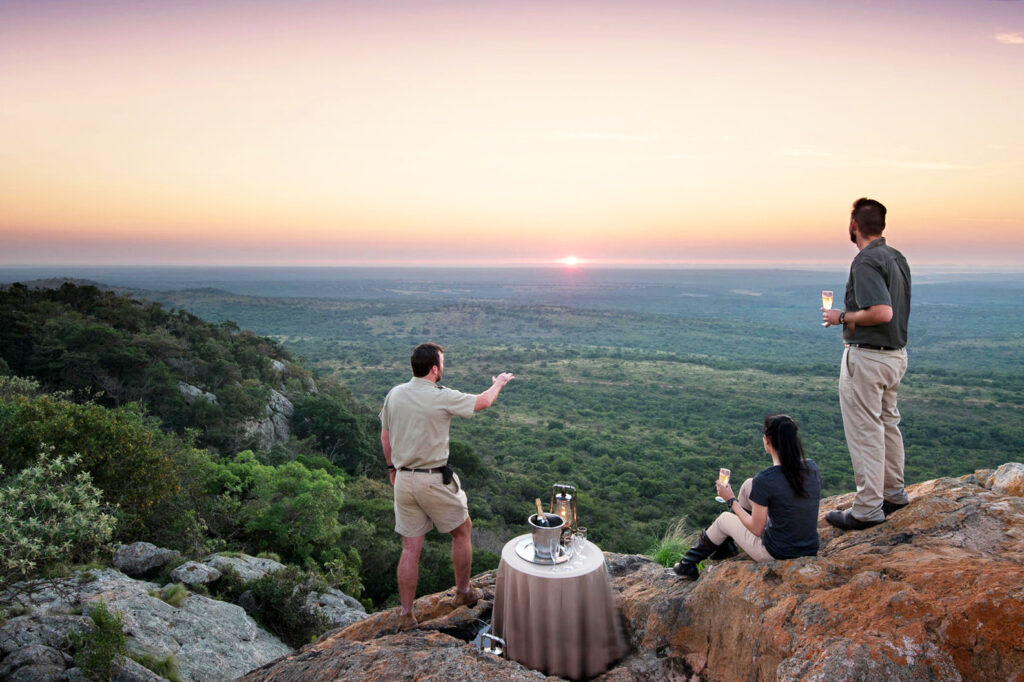
South Africa is not entirely malaria-free, but it is considered low risk and, in some pockets, no-risk. To understand why, it’s helpful to think about climate.
Two things need to occur for malaria transmission to transpire: the presence of Anopheles mosquitoes carrying the plasmodium falciparum parasite, and for the parasite to fully incubate to maturity. Both thrive in the high temperatures and humidity of tropical and subtropical climates where rainfall contributes to standing water. (Mosquitoes lay eggs near water.) Below 68°F (20°C), the parasite will not survive which is why we can observe varying levels of transmission within a single country. Gaining elevation, traveling during the cooler seasons, and in arid landscapes all reduce the risk of malaria.
Unlike some of its sub-Saharan neighbors that experience malaria year-round, South Africa’s distance from the equator results in distinct seasons where the average temperature dips below the critical 68°F threshold. From April through October, the mean temperature fluctuates between 52°F and 66°F (11°C – 19°C). With varied terrain and elevation, more than 90 per cent of South Africa falls outside of the malaria risk map, making it an appealing destination for travelers who don’t want to bother with medication.
When malaria is transmitted in South Africa, it’s mainly along the country’s northeastern borders with peak cases observed in January and February.
In the moderate risk zone that borders Zimbabwe and Mozambique, antimalarial drugs are recommended, but just seasonally (September through May). In the low-risk areas, mosquito avoidance is sufficient (using repellent, covering your skin and if necessary, sleeping beneath a net) and only recommended seasonally.
Top picks for the best malaria-free safari in South Africa
With most of South Africa falling well beyond the risk zone, travelers have a wide range of options when choosing a malaria-free safari destination. Here are Extraordinary Journeys’ top picks.
1. Kwandwe Private Game Reserve
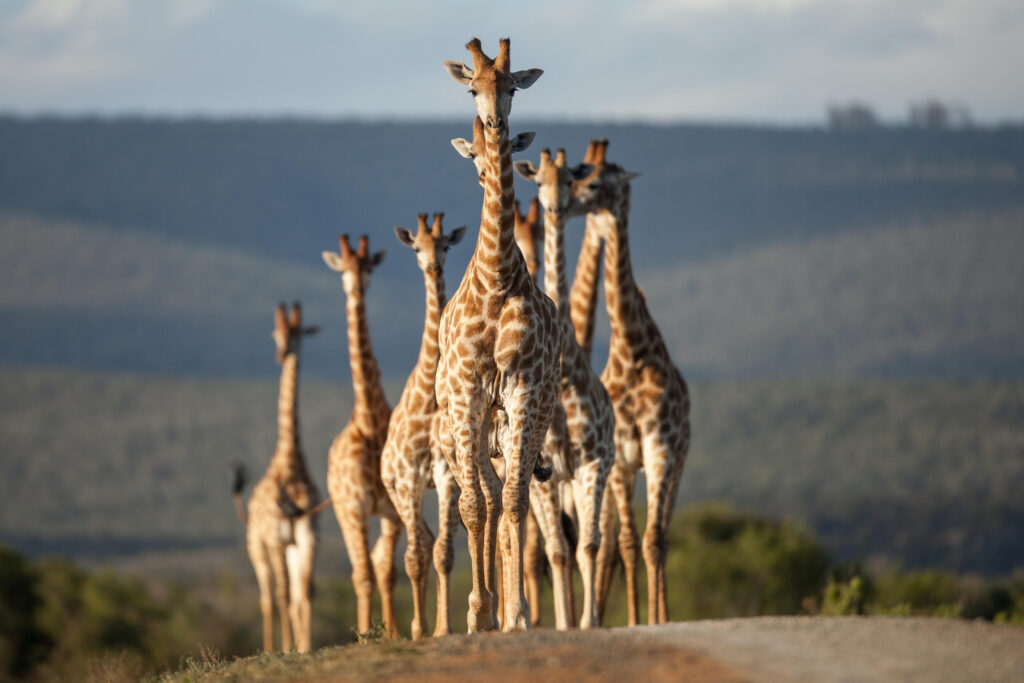
Located in the Eastern Cape province, Kwandwe Private Game Reserve boasts 54,000 acres of private wilderness area. It’s a Big Five (lion, leopard, elephant, African buffalo, and rhinoceros) destination, home to both black and white rhino. Within Kwandwe’s borders are 19 miles of the Great Fish River, lending itself to a more diverse landscape and great wildlife sightings. There are only four properties in the Reserve (Great Fish River Lodge, Ecca Lodge, Uplands Homestead, and Melton Manor) totaling just 26 beds, making for an excellent guest-to-wilderness ratio. Melton Manor, Uplands Homestead, and Fort House are exclusive-use properties perfect for families and small groups.
2. Amakhala Game Reserve
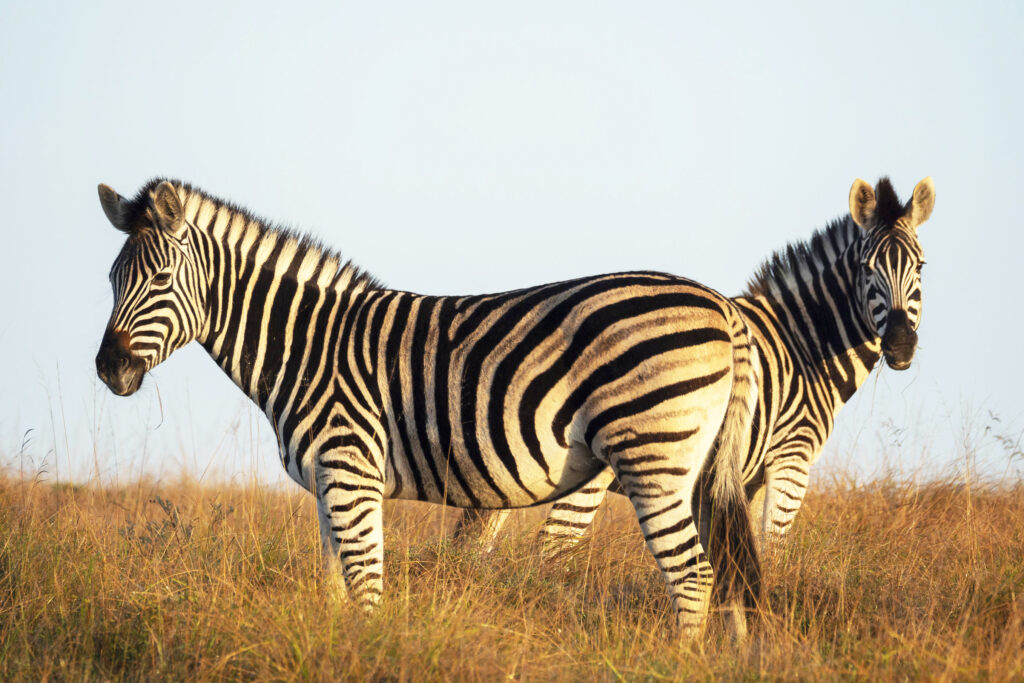
The Amakhala Game Reserve encompasses 18,000 acres of protected bushveld located in the Eastern Cape province. The area was settled in the 1800s by a handful of families who farmed sheep and cattle right up until the turn of the century. In 1999, a joint conservation effort of lodge owners, all of whom were direct descendants of the original Frontier settlers, was established. The efforts have reintroduced indigenous flora and fauna with great success. Now, safari-goers might spot the Big Five, hyena, black wildebeest, giraffe, zebra, and antelope. There are 10 dreamy properties on the Reserve, offering a broad range of lodgings from restored country homes to tented camps. Located in a secluded corner of the Reserve and set on the banks of the Bushman’s River, the family-operated HillsNek Lodge is EJ’s top pick. We love the luxurious tented chalets for their deep soaker tubs, splendid open-air bush showers, and the wraparound decks that offer commanding views of the plains.
3. Shamwari Private Game Reserve
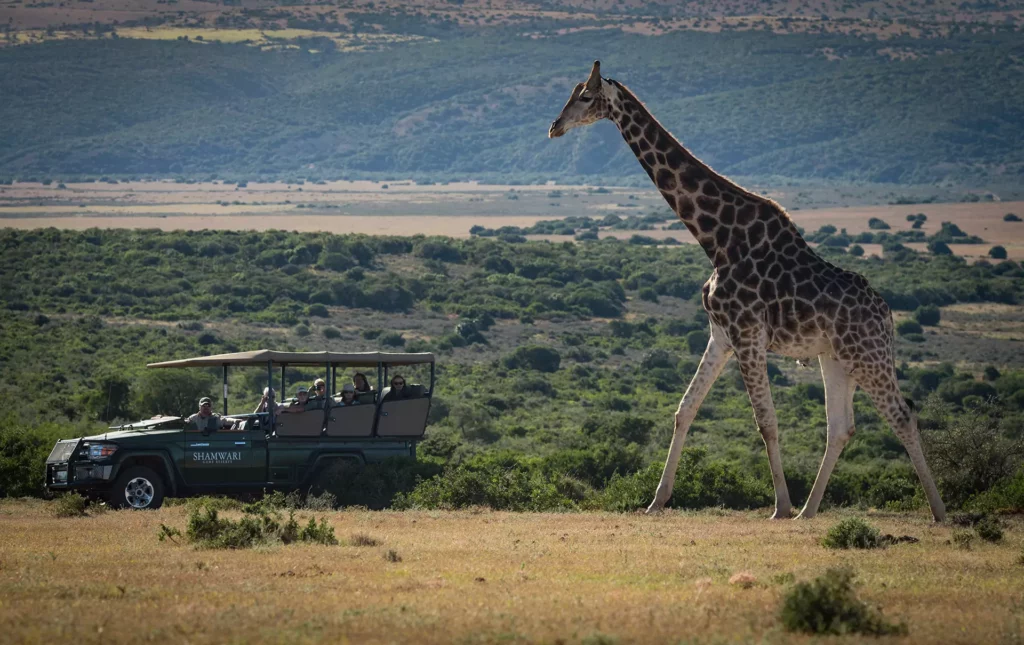
Another fantastic Eastern Cape safari destination, the 61,776-acre Shamwari Private Game Reserve spans five South African biomes, attracting a diversity of wildlife and flora. The Albany thicket that predominantly carpets the Reserve appeals to the Big Five, kudu, black rhino, monkeys, and bushbuck. Abundant biodiversity wasn’t always a given at Shamwari; the Reserve was established in the early 1990’s to reverse nearly three centuries of human activity that had negatively impacted indigenous wildlife. Today, there are seven superb accommodations to choose from, ranging from the private Sarili villa to the family-friendly Riverdene to the prim Long Lee Manor. Intrepid travelers who visit between October and May can take a stroll on the wild side by booking a stay at Shamwari’s seasonal bush camp, Explorer Camp, which celebrates walking safaris.
4. Kariega Game Reserve
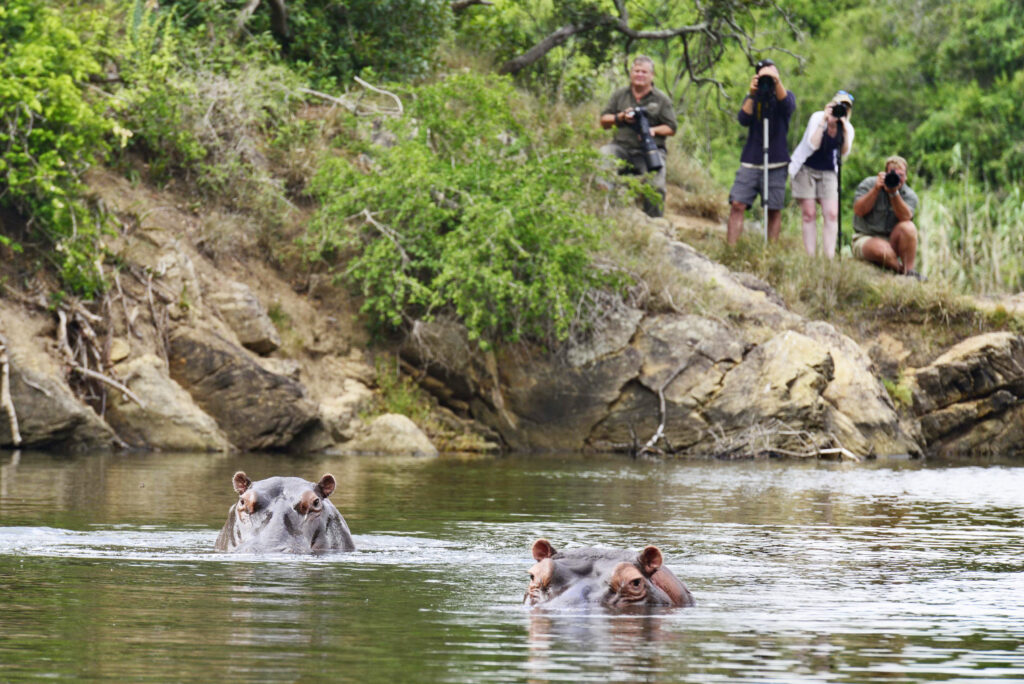
Before Kariega Game Reserve’s 1989 inception, the overburdened land had been owned by 21 private farmers. It has taken more than three decades and immense consolidation to have grown the initial 1,230-acre land purchase to what we see today: 28,417 acres of spectacular Eastern Cape reserve land where lions, elephant, rhino, buffalo, leopard, hippo, hyena, giraffe and zebra thrive. Game drives and bush walks bring safari-goers through varied ecosystems such as fynbos, riverine forests, valley bushveld, and acacia woodlands. Uniquely, the Reserve is threaded by two rivers, inviting guests to enjoy boat cruises, paddle a canoe, or cast a line. Kariega offers a five-star tented experience (Settlers Drift), 24 log chalets (at Main Lodge), a private-use villa (The Homestead), 10 suites at River Lodge (which connects to the sea), and the rustic-meets-luxurious Ukhozi Lodge.
5. Waterberg Region
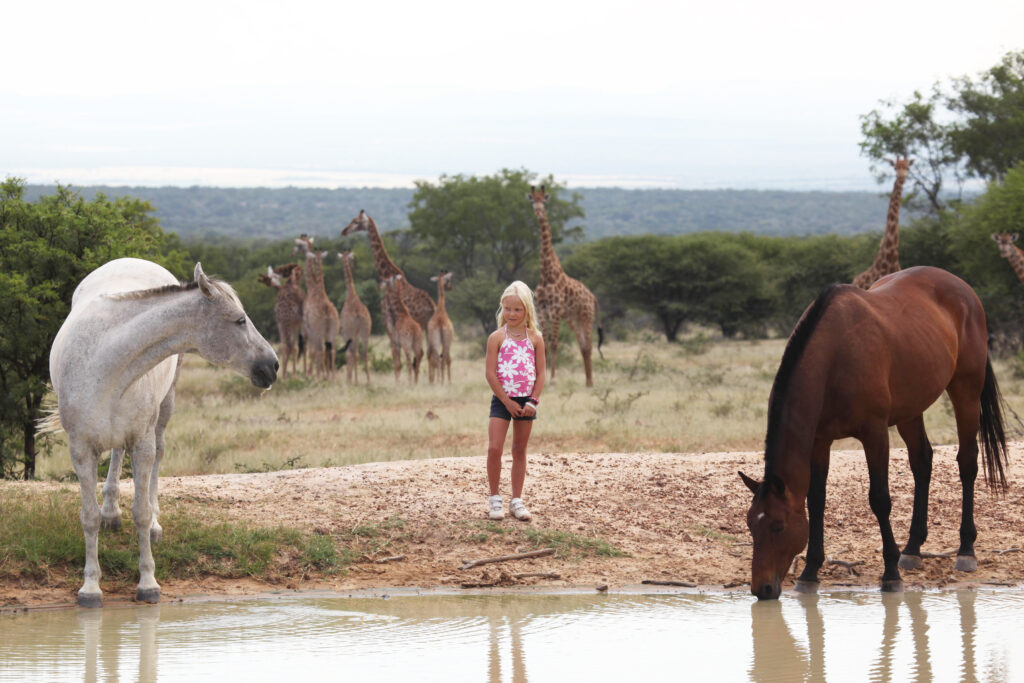
The Waterberg Region is an exceptional wilderness area in the northern Limpopo province that has earned UNESCO World Biosphere Reserve status. The 5,600 square-mile expanse is graced with outstanding vistas, clear streams, rolling bushveld hills, and mountain gorges. There are just two accommodations: Ant’s Hill and Ant’s Nest—both owned and operated by the Baber family—set within a 12,500-acre private game reserve within the Waterberg bushveld. (Either lodge can be booked for exclusive-use, or parties can book single rooms.) Rife with biodiversity and home to the Big Five, guests can explore the varied topography via game drives or on foot, but the signature offering here is horse safaris. Home to a stable of 90-plus horses that have been adapted to the environment, viewing African wildlife over the ears of a pony is unlike any other safari experience. Groups are limited to six riders per departure and cater to all riding abilities.
6. Marataba Contractual National Park
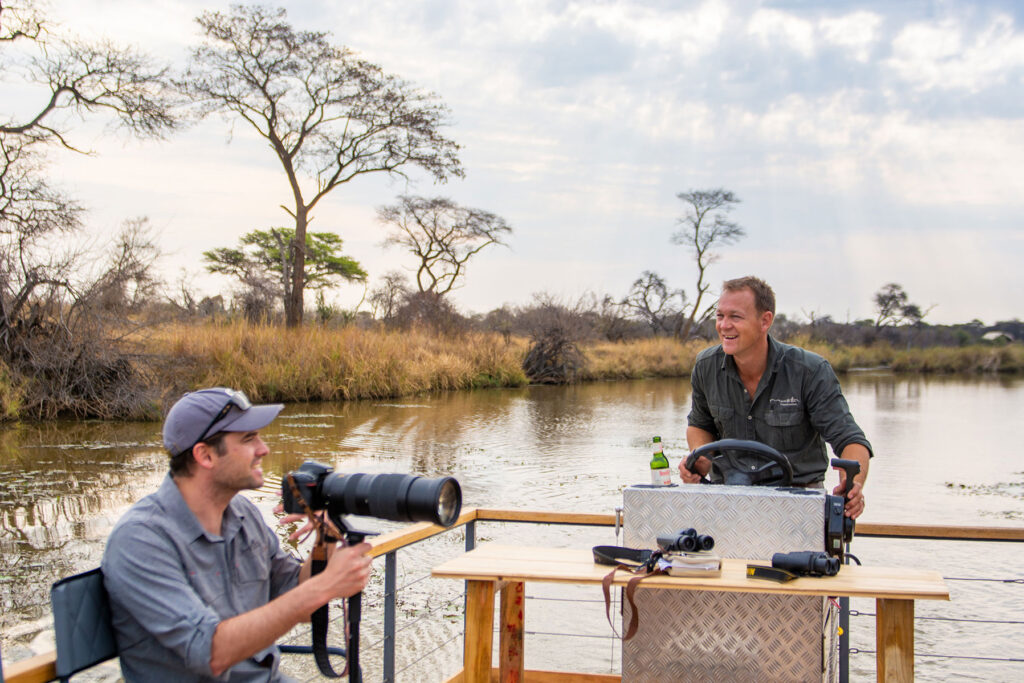
Also located in Limpopo province’s Waterberg Region is Marataba, a 52,000-acre privately managed section of the Marakele National Park. Here, at the foot of the Waterberg Mountains with the winding Matlabas River in the foreground, bushveld gives way to Kalahari sands. This remarkable landscape is home to the Big Five and a globally consequential population of white and black rhino. With just four lodging options, Marataba is an intimate safari destination. The four-suite, exclusive-use Founders lodge and six tented suites at Explorers are dubbed “conservation camps” where guests can lean into experiences not limited to rhino research and notching, elephant monitoring, and setting camera traps. For a more refined stay, Marataba Mountain Lodge’s five eco-suites and Safari Lodge’s 15 tented suites are exactly what travel dreams are made of.
7. Tswalu Kalahari Game Reserve
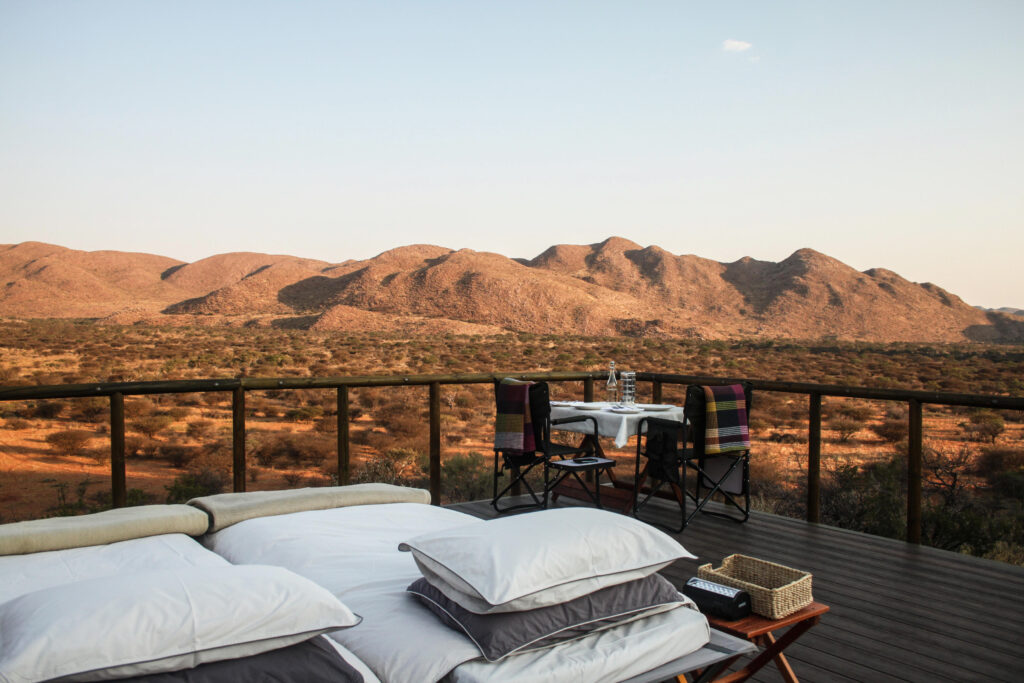
Spanning 247,000 acres, Tswalu Kalahari Game Reserve is South Africa’s largest private game reserve. Located in the heart of the Northern Cape province, Tswalu was built on the principles of conservation. Thanks to the safeguarding of vital habitat and the restoration of biodiversity, the Reserve offers superlative game viewing: desert black rhino, white rhino, black-maned Kalahari lions, leopards, cheetah, meerkats, giraffe, antelope, and more.
To keep Tswalu wild, the Reserve features just three boutique safari camps: The Motse with nine suites; Tarkuni, a private, exclusive-use homestead; and Tswalu Loapi Tented Camp, six privately staffed pavilion-style safari homes. (Considered among the best South Africa safari lodges.) Translation: even at full capacity (~40 adults), Tswalu represents the lowest ratio of guest-to-wilderness in a privately protected area in South Africa. Star beds, a dining boma, a restaurant stewarded by a celebrated chef (Klein JAN), and suites constructed of earthy materials in organic shapes make leaving Tswalu difficult. Bespoke daily itineraries are the cherry on top.
8. Madikwe Game Reserve
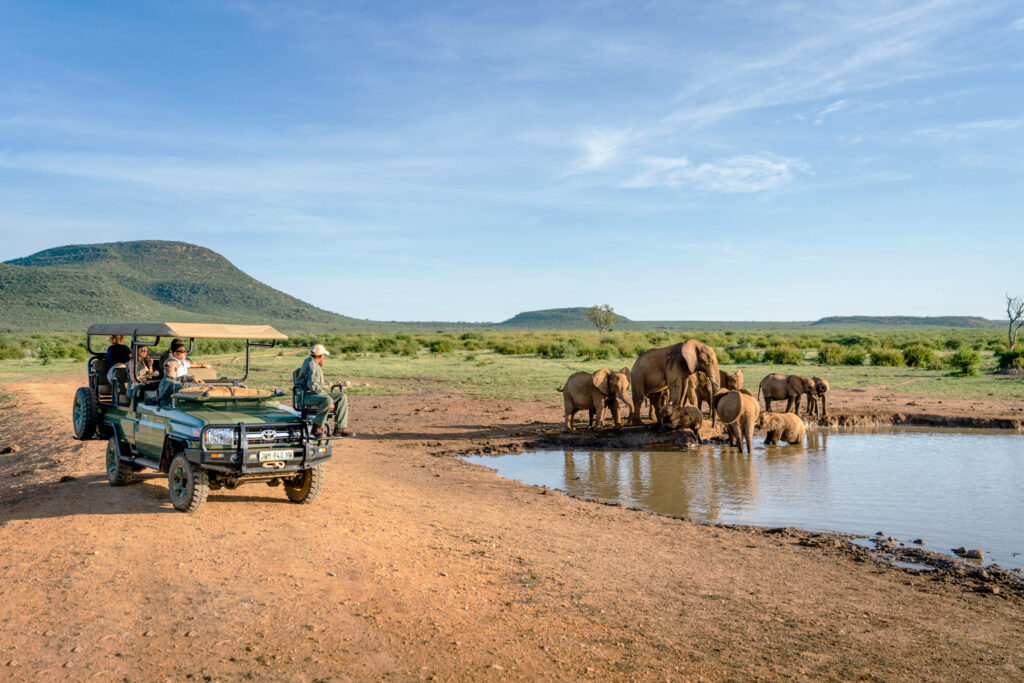
Located in the North West province bordering Botswana, Madikwe Game Reserve spans 185,329 acres and represents a tremendous wildlife comeback story. After failed attempts to farm the land, the Reserve was established in 1991. Under the banner of “Operation Phoenix,” 10,000 animals across 27 species were successfully reintroduced over a six-year period. Today, Madikwe is a hot spot for the Big Five, in addition to a thriving population of wild dogs. The Reserve also falls upon the junction of two unique ecosystems—Kalahari thornveld and bushveld—and examples of sentinel inselbergs (“island mountains”) can be seen to the west. Despite it being just a four-hour drive from Johannesburg/Pretoria, Madikwe remains a lesser-touristed reserve. Featuring a higher number and density of camps and lodges than the other private reserves on this list (more than two dozen), EJ safari specialists recommend Jaci’s Safari Lodge and Mateya Safari Lodge for exceptional guiding.
9. Samara Private Game Reserve
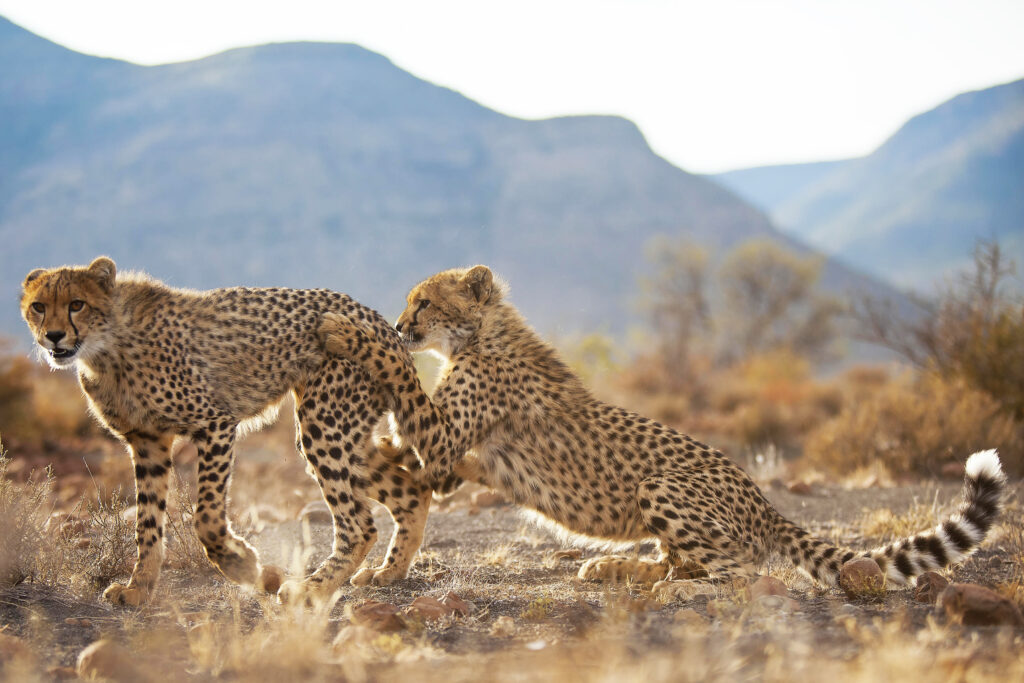
Overlaying four of South Africa’s provinces, The Karoo is a semi-desert region larger than the size of Germany. Sometimes likened to Australia’s Outback, the landscape is one of vast open plains hemmed by mountains. Snug in the Karoo is the 67,000-acre Samara Private Game Reserve, a place where an ambitious but successful conservation story has been unfolding since 1997 when the land was purchased by Mark and Sarah Tompkins. A painstaking rewilding project was undertaken, first eradicating invasive plant species, removing fences, and resting depleted farmland, followed by the reintroduction of indigenous, iconic, and endangered species. Guests of the two intimate on-Reserve properties (The Manor and Karoo Lodge) are situated at the convergence of five unique vegetation biomes—grasslands, Nama Karoo, savannah, thicket, and forest—which support thriving populations of nearly 60 mammals. In this born-again wilderness, safari-goers can spot the Big Five and enjoy the Reserve’s signature experience, tracking cheetahs on foot.
10. Phinda Private Game Reserve
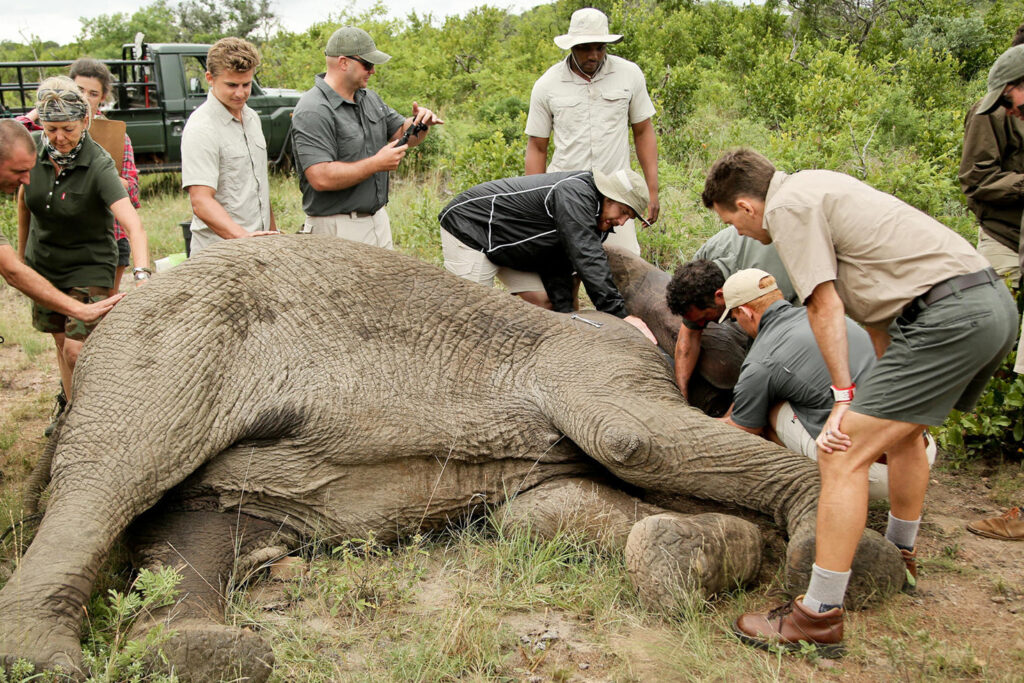
Phinda Private Game Reserve is located in KwaZulu-Natal, a province known for its swimmable and surfable coast, tall mountains and big game savannah. We love Phinda for its diverse habitats (seven ecosystems within 66,133 acres) that support wildlife including the Big Five, elusive cheetah, rare black rhino and 436 bird species. Phinda is owned by &Beyond and represents the company’s flagship property. There are six swoon-worthy luxury lodges peppered throughout the Reserve; EJ’s favorites are Phinda Zuka and Phinda Vlei. Guests interested in conservation-focused safari experiences can assist with rhino tracking and (painless) dehorning, elephant collaring, or pangolin monitoring to better understand the world’s most trafficked animal. Choosing Phinda as your safari destination also means easy Indian Ocean beach excursions like scuba diving and seasonal turtle nesting.
It is important to acknowledge that Phinda is in a low-risk malaria zone. Antimalarial tablets are not recommended, but travelers visiting between September and May should practice mosquito avoidance.
Family-friendly luxury Africa safari itineraries
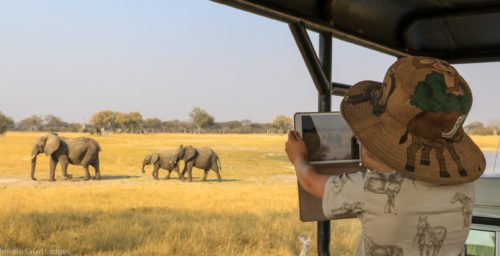
- Itinerary
Family Fun Safari Across Southern Africa
Top safari experiences in Botswana & Zimbabwe geared toward young families
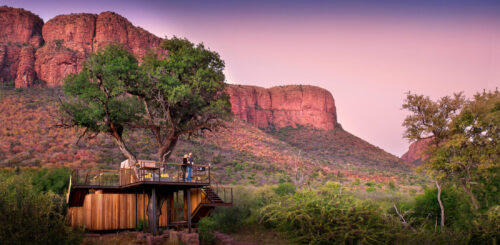
- Itinerary
Malaria-Free South Africa for Families
A malaria-free safari and time in Cape Town
Keed reading about luxury family safaris
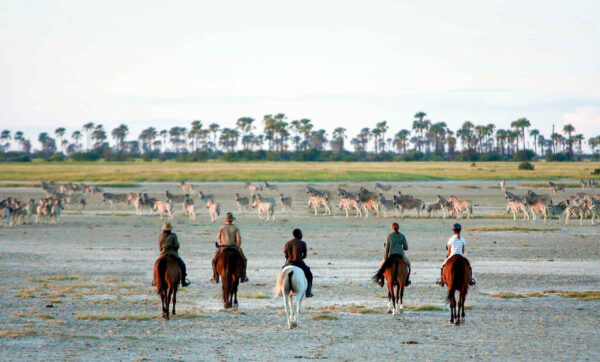
Botswana Family Safaris: The Best Lodges and Camps
As far as luxury safaris go, Botswana is an easy destination to love. Committed to…
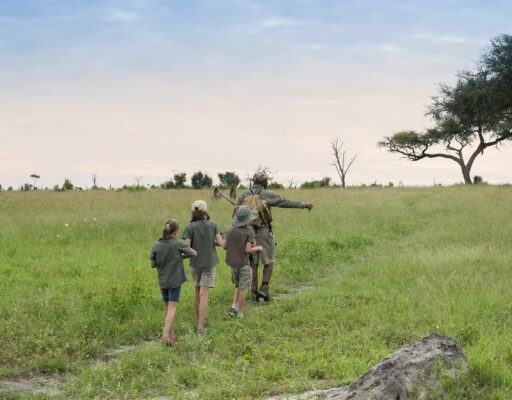
Family Safari: Expert Answers to The Top 24 Questions About Africa
Got questions about a safari with kids? We answer 24 common questions about planning a…
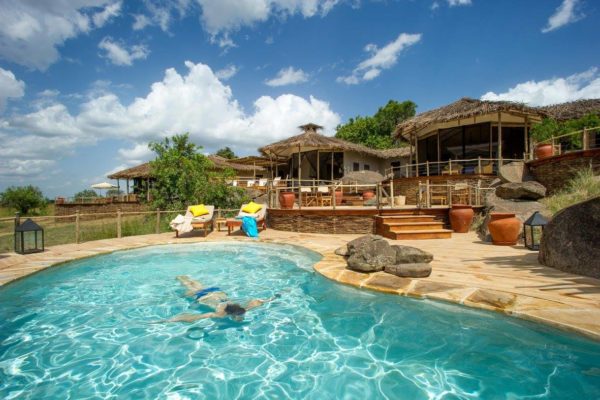
9 Perfect Properties for a Multigenerational Safari
Across Kenya, Tanzania, and down to South Africa, the whole family can enjoy safari in…
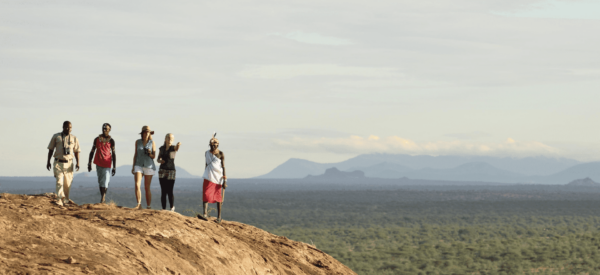
5 Safari Activities Your Teens Will Love
Ensure your teenager will have a great time on a family safari in Africa with these…
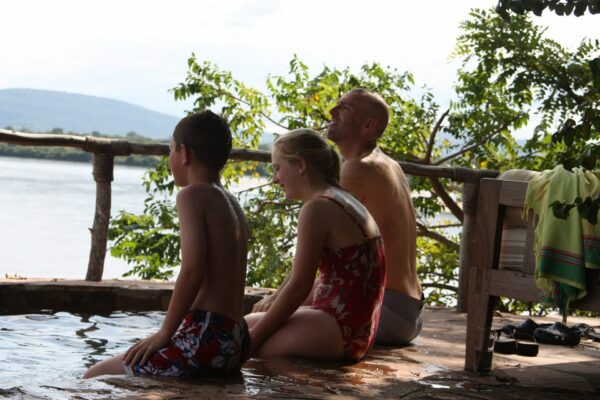
A Family Safari in the Selous Tanzania
A family of avid safari-goers travels to the Selous in Tanzania’s Southern Circuit to…
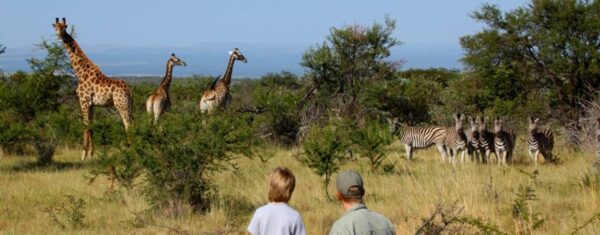
Ant’s Nest Active & Kid Friendly
Ant’s Nest Active & Kid Friendly, As part of an on-going conversation about…
Plan your malaria-free safari with us!
Ready to start planning your own incredible adventure? We make the process stress-free and enjoyable.
